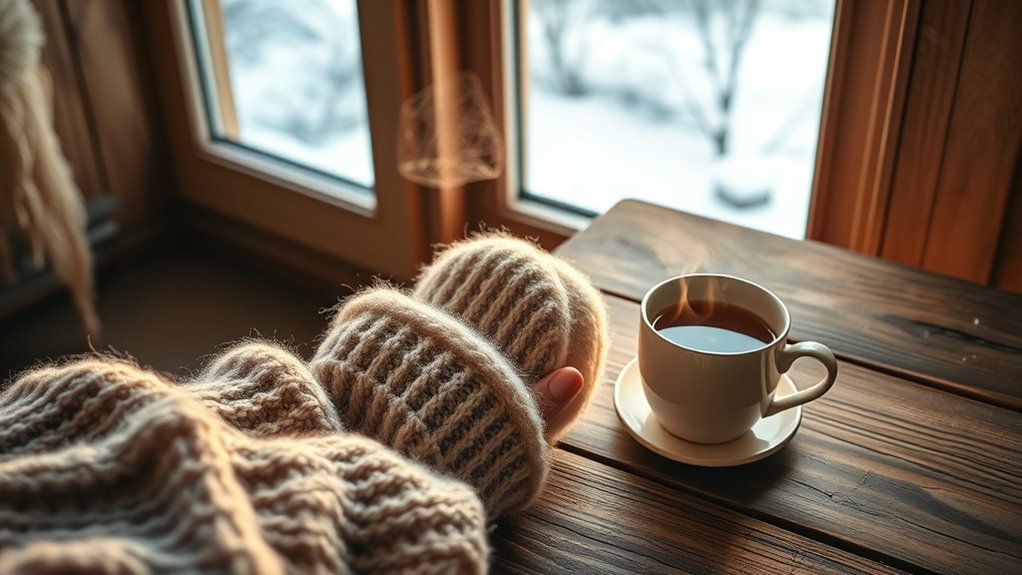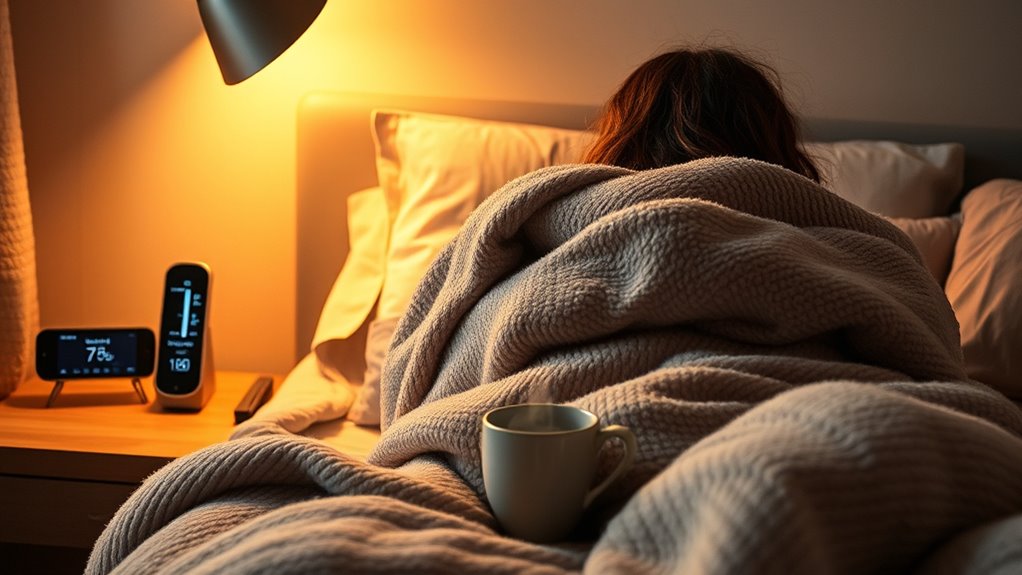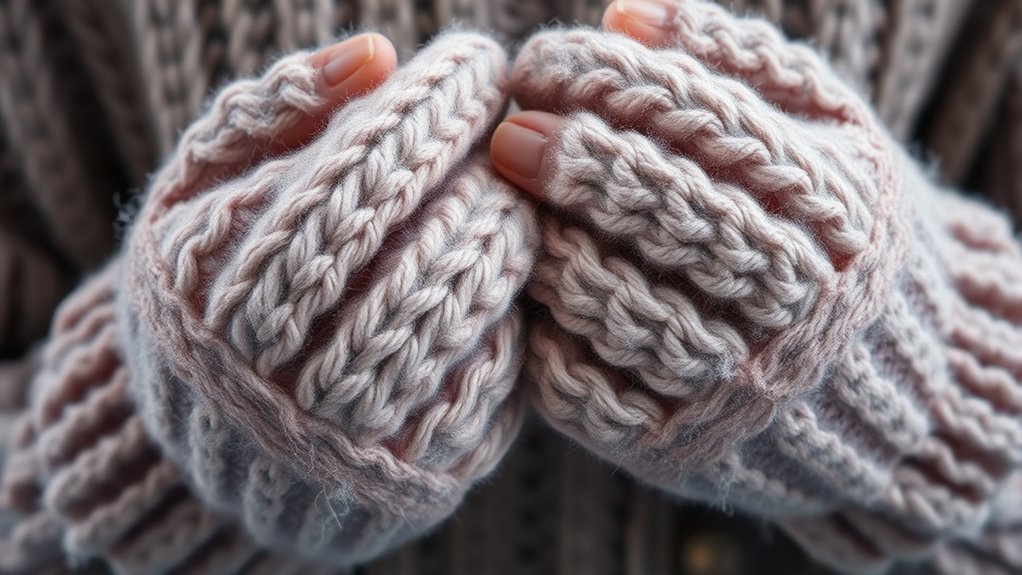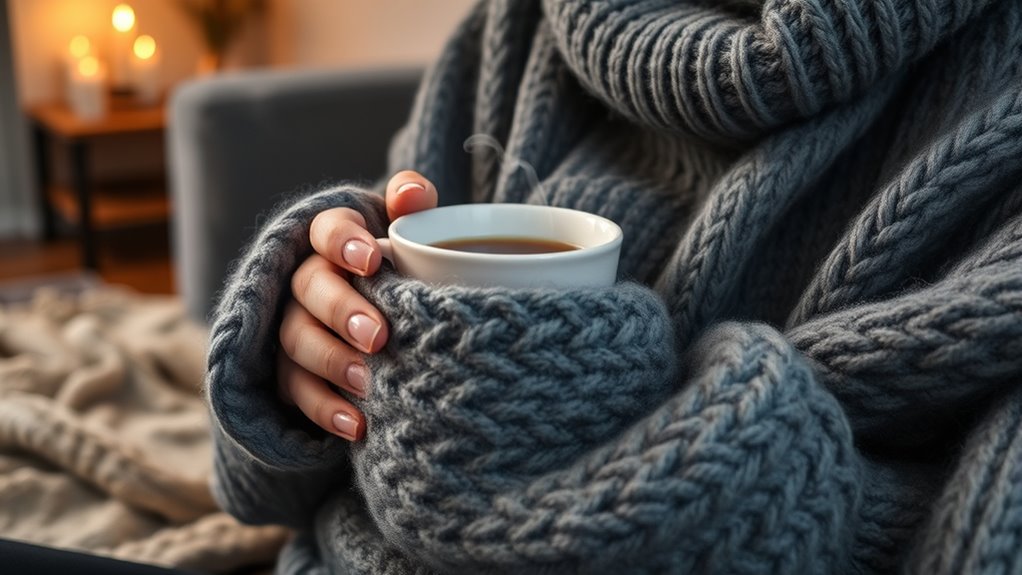If you’re always cold, your body might be struggling to regulate temperature due to medical issues like hypothyroidism, circulatory problems, or poor circulation. Improving warmth involves eating warm foods, staying hydrated, exercising regularly to boost circulation, and layering your clothing properly. You can also try simple home remedies like warming compresses or improving sleep conditions. Keep exploring these tips to better understand how your body maintains warmth and what others can do to feel warmer.
Key Takeaways
- Medical conditions like hypothyroidism and circulatory issues can impair heat production and circulation, causing persistent cold feelings.
- Eating warm foods, staying hydrated, and consuming nutrients like iron and vitamin B12 boost metabolism and thermogenesis.
- Regular exercise and core-strengthening activities improve circulation and help maintain body warmth.
- Proper layering with moisture-wicking, insulating, and windproof clothing traps heat and prevents cold exposure.
- Stimulating circulation through movement, warm baths, and healthy habits enhances body temperature regulation and reduces cold sensitivity.
Understanding How Your Body Regulates Temperature

Your body actively works to keep your internal temperature within a narrow range, even when the environment around you changes. It uses thermoregulation mechanisms to achieve this balance. Central to this process are body temperature sensors located in your skin, brain, and other organs. These sensors constantly monitor your temperature and send signals to your brain’s hypothalamus, which acts as your body’s thermostat. When your body senses that you’re too cold, it responds by constricting blood vessels to conserve heat, shivering to generate warmth, or increasing metabolic activity. Conversely, if you’re too warm, it promotes sweating and vasodilation to cool you down. These thermoregulation mechanisms work seamlessly, allowing you to adapt to temperature fluctuations and maintain ideal internal conditions. Additionally, understanding the role of temperature sensors can help in identifying issues related to abnormal temperature regulation.
Common Medical Causes of Feeling Cold All the Time

Feeling cold all the time can be a sign of underlying health issues that disrupt normal body temperature regulation. Two common medical causes are thyroid health problems and circulatory issues. An underactive thyroid, or hypothyroidism, reduces metabolism, making you feel colder. Circulatory issues, like poor blood flow, prevent warm blood from reaching extremities, leaving you chilly. Here’s a quick overview:
| Cause | Effect | Symptoms |
|---|---|---|
| Thyroid health | Slows metabolism, lowers heat production | Fatigue, weight gain, cold intolerance |
| Circulatory issues | Reduced blood flow, limits warmth | Numbness, pale skin, cold extremities |
| Both | Disrupted heat regulation | Persistent cold feeling |
Understanding these causes helps identify if medical treatment is needed. Additionally, monitoring your health status can provide early clues to underlying issues affecting temperature regulation.
The Role of Nutrition and Hydration in Maintaining Body Heat

Eating warm foods can help boost your metabolism and generate more body heat. Staying well-hydrated keeps your temperature regulated and prevents chills. Plus, essential nutrients support thermogenesis, making it easier to stay warm in cold conditions. Incorporating nutrient-dense juices like spinach or citrus can further enhance your body’s ability to maintain warmth.
Warm Foods Boost Metabolism
Consuming warm foods can effectively boost your metabolism by increasing body temperature and promoting calorie burning. Warm foods, like soups, stews, and teas, provide a metabolic boost by requiring your body to work slightly harder to digest and process them. This process, called thermogenesis, helps generate additional body heat, which can be especially beneficial if you’re always cold. Incorporating these foods into your diet can support your efforts to maintain a warmer core temperature naturally. Plus, warm foods are often nutrient-dense, making them a healthy choice overall. Regularly including warm meals can encourage your body’s metabolic processes to stay active, helping you stay warmer longer. Using the right bicycle gear shifting techniques while exercising can also help improve circulation and body heat. This simple dietary adjustment can be a powerful tool in managing your overall temperature tolerance.
Hydration Regulates Body Temperature
Maintaining proper hydration is essential for regulating your body temperature, especially when warm foods boost your metabolism and generate heat. Adequate hydration levels help your body efficiently manage heat by supporting sweat production and circulation. If your fluid intake drops, your body struggles to cool itself, making you feel colder. Drinking enough water throughout the day ensures your internal temperature stays balanced, preventing unnecessary heat loss. Dehydration can impair your body’s ability to generate or retain heat, worsening feelings of coldness. Be mindful of your hydration levels, especially in colder weather or when you’re less inclined to drink. Consistent fluid intake keeps your body functioning at its best, helping you stay warmer and more comfortable naturally. Additionally, understanding the importance of body temperature regulation can aid in making informed choices about hydration and nutrition.
Nutrients Support Thermogenesis
Since certain nutrients can actively boost your body’s heat production, proper nutrition plays an essential role in supporting thermogenesis. Vitamin B12 is crucial because it helps convert food into energy efficiently, which can generate more body heat. Without enough B12, your metabolism slows, making it harder to stay warm. Iron deficiency is another common issue that hampers thermogenesis since iron is vital for oxygen transport in your blood, fueling your cells’ energy production. A lack of iron can lead to fatigue and cold sensitivity. To support your body’s heat production, focus on foods rich in vitamin B12, like meat, eggs, and dairy, and ensure you’re getting enough iron from sources such as red meat, spinach, or legumes. Proper nutrition keeps your metabolism active and helps you stay warmer naturally. Incorporating nutrient retention strategies can also help preserve these vital nutrients during food preparation, maximizing their benefits for thermogenesis.
How Exercise Can Help Improve Your Body’s Warmth Response

Regular exercise improves your body’s warmth response by increasing circulation, helping heat reach your extremities more effectively. It also boosts your metabolic rate, generating more internal heat, and builds core strength to better regulate temperature. Incorporating physical activity into your routine can make a noticeable difference in how your body handles cold conditions. Additionally, engaging in mindful practices like goal setting can enhance your motivation to maintain consistent exercise habits.
Boosts Circulatory Efficiency
Exercise actively enhances your circulatory system, making it more efficient at delivering warmth throughout your body. Improved circulatory health means your blood vessels become stronger and more responsive, which boosts blood flow enhancement. As a result, warm blood reaches your extremities more quickly, reducing feelings of coldness. Regular physical activity stimulates your heart and promotes better circulation, ensuring nutrients and heat are distributed evenly. This increased efficiency helps your body maintain a stable internal temperature, especially in colder environments. Over time, consistent exercise strengthens your vascular system, making your body’s warmth response more effective. By focusing on activities that elevate your heart rate, you support your circulatory health and improve your ability to stay warm naturally. Circulatory efficiency can be further supported by maintaining proper hydration and a balanced diet.
Enhances Metabolic Rate
Engaging in physical activity boosts your metabolic rate, which in turn helps your body generate and retain heat more effectively. When you exercise, your energy expenditure increases, prompting your body to burn more calories even after you finish. This heightened metabolic activity produces additional internal heat, making you feel warmer. Regular movement also encourages your body to become more efficient at converting fuel into energy, further supporting warmth regulation. Over time, increased metabolic rate from consistent exercise can improve your body’s ability to respond to cold temperatures. By elevating your energy expenditure, you create a natural heat source within your body, helping you stay warmer without relying solely on external heating methods. Incorporating powerful persuasive words into your routine can motivate you to stick with these habits for better cold resilience.
Builds Core Strength
Building core strength can markedly enhance your body’s ability to regulate warmth because a sturdy core provides better stability and support for your posture and movements. When your core muscles are strong, your posture alignment improves, reducing energy waste and helping your body operate more efficiently. Better core stability also means you can maintain proper body positioning, which minimizes heat loss caused by poor posture. Engaging in core-strengthening exercises like planks, sit-ups, or Pilates can boost muscle tone in your abdomen and back, contributing to overall warmth retention. As your core becomes more resilient, your body can generate and conserve heat more effectively. Additionally, muscle tone plays a crucial role in maintaining body temperature by facilitating efficient heat production and retention. This improved stability not only supports daily activities but also helps you stay warmer in colder environments.
The Impact of Clothing and Layering on Your Comfort

Clothing and layering play a crucial role in how comfortable you feel in different temperatures. Using effective layering techniques helps trap body heat and keeps cold air out. Start with a moisture-wicking base layer made of materials like wool or synthetic fibers, which draw sweat away from your skin. Add an insulating layer, such as fleece or down, to retain warmth. Top it off with a windproof or waterproof outer layer to protect against the elements. Choosing clothing materials wisely ensures better insulation and comfort. Avoid cotton, as it retains moisture and can make you feel colder. Proper layering allows you to adjust your clothing easily throughout the day, helping you stay warm without overheating. Mastering layering techniques is key to boosting your overall comfort in chilly conditions.
Simple Home Remedies to Boost Circulation and Warmth

When you’re trying to stay warm, improving circulation can make a noticeable difference. Simple home remedies like regular movement, brisk walking, or stretching help boost your circulatory health, keeping blood flowing efficiently. Staying active encourages warmth by increasing blood flow to extremities. Additionally, consider incorporating foods rich in iron, vitamin B12, and other nutrients to combat common vitamin deficiencies that can impair circulation. Hydration is also essential—drinking plenty of water keeps blood viscosity ideal. Using warm compresses or taking warm baths can directly raise your body temperature and stimulate blood flow. Avoid smoking and excessive caffeine, as these can constrict blood vessels. By focusing on these small adjustments, you’ll support your circulatory health and naturally stay warmer at home.
Sleep Habits and Environment That Affect Body Temperature

Your sleep environment plays a crucial role in maintaining your body temperature throughout the night. A cool, dark, and well-ventilated sleep environment helps prevent overheating and keeps your body at a comfortable temperature. Using breathable bedding and adjusting your room temperature to around 60-67°F (15-19°C) can improve your sleep quality and warmth. Bedtime routines also influence your body temperature; a relaxing routine, such as taking a warm bath or doing gentle stretches, can promote better thermoregulation before bed. Avoid caffeine or heavy meals close to bedtime, as they can disrupt your body’s natural cooling and warming cycles. Consistently optimizing your sleep environment and bedtime habits ensures your body maintains a stable temperature, helping you stay warm and sleep more soundly through the night.
Managing Stress and Its Influence on Body Temperature Tolerance

Managing stress can considerably influence your body’s ability to regulate temperature, as heightened stress levels trigger hormonal responses that affect blood flow and heat production. When you’re stressed, your body releases cortisol, a hormone that impacts how your blood vessels dilate or constrict. Elevated cortisol levels can cause blood vessels to narrow, reducing blood flow to your extremities and making you feel colder. Chronic stress also disrupts your body’s natural temperature regulation, making it harder to stay warm. By managing stress through relaxation techniques, exercise, or mindfulness, you can help keep cortisol levels balanced and support better blood circulation. This, in turn, improves your body’s capacity to maintain a comfortable temperature, reducing the sensation of being perpetually cold.
When to Seek Medical Advice for Persistent Coldness

Persistent coldness that doesn’t improve despite efforts to stay warm may indicate an underlying health issue that requires medical attention. If you notice cold hands, frequent chilly mornings, or persistent numbness, it’s time to consult a doctor. Seek help if:
- Your cold hands or feet are accompanied by skin color changes or pain.
- You experience fatigue, dizziness, or unexplained weight loss alongside coldness.
- Coldness persists despite lifestyle adjustments and home remedies.
These symptoms could signal circulation problems, thyroid issues, or other health concerns. Don’t ignore persistent coldness—it might be more than just feeling chilly. Getting a professional evaluation ensures you identify and address any underlying conditions early.
Frequently Asked Questions
Can Cold Sensitivity Be Inherited From Family Members?
You might wonder if cold sensitivity runs in your family. It’s possible because of a genetic predisposition or family history, which can influence how your body regulates temperature. If relatives have always felt colder than others, you could inherit traits affecting circulation or metabolism. While genetics play a role, other factors matter too. Knowing your family history can help you understand and manage your cold sensitivity better.
How Do Hormonal Changes Affect Body Temperature Regulation?
Hormonal fluctuations markedly impact your body’s temperature regulation. When hormones like thyroid hormones or estrogen shift, they can cause you to feel colder or warmer than usual. These changes affect how your body maintains its internal temperature, making you more sensitive to cold or heat. Understanding these hormonal effects helps you manage temperature tolerance better, whether through lifestyle adjustments or consulting a healthcare professional for proper diagnosis and treatment.
Are There Specific Supplements That Can Help Increase Body Warmth?
Did you know some herbal remedies and dietary adjustments can naturally boost your body warmth? You might find that taking ginger or ginseng supplements helps improve circulation, making you feel warmer. Incorporate foods rich in healthy fats and iron, like nuts and leafy greens, to support metabolism. These simple changes, combined with herbal remedies, can enhance your body’s ability to regulate heat and keep you cozy throughout the day.
Does Aging Naturally Reduce Body Temperature Tolerance?
Aging can naturally reduce your body’s temperature tolerance due to genetic factors and a decreasing metabolic rate. As you age, your body may produce less heat, making you feel colder more often. Your genetic makeup influences how efficiently your body regulates temperature, and a slower metabolic rate means less heat generation. To combat this, you can stay active, dress warmly, and maintain a healthy lifestyle to support your body’s heat production.
Can Environmental Factors at Work Influence Feeling Cold Constantly?
Think of your work environment as a chilly wind that seeps through cracks. If your workspace is drafty or poorly insulated, you’ll feel cold more often. Clothing insulation plays an essential role—wearing layers keeps heat close, but inadequate attire won’t cut it. So, yes, environmental factors at work can make you feel constantly cold, and adjusting your clothing or improving insulation can help you stay warmer and more comfortable.
Conclusion
By tuning into your body’s signals and making simple changes, you can turn the tide on feeling cold all the time. Think of your warmth as a delicate flame—you hold the power to nurture it with proper care, nourishing foods, and cozy habits. Don’t let the chill dampen your spirit; instead, stoke your internal fire and embrace a warmer, more comfortable life. Your body’s natural warmth is within your grasp—just spark it to life.









